Privacy protection is extremely important in the Web3 field, and we believe that fully homomorphic encryption is the best solution to most privacy protection issues.
Author: Maggie, Foresight Ventures

Good afternoon, everyone! Thank you for coming. I am Maggie, the research director of Foresight Ventures. In the next 20 minutes, we will delve into fully homomorphic encryption (FHE) from the perspective of venture capital and discuss why we believe it is a transformative investment.
So, why should we invest in fully homomorphic encryption? This starts with the privacy needs of Web3.

In Web3, privacy is extremely important. Without proper privacy measures, there will be a lot of fraud and malicious activities.
For example, in the MEV issue, sandwich attacks may cause users to suffer losses. There are also vampire attacks, where competitors can steal your customers because they know your customer's address. In addition, privacy leaks are also a major problem. If your wallet address is leaked, it's like all your spending records are exposed in real life, you lose your privacy, and are likely to become a target for fraud and phishing attacks. On the blockchain, while maintaining transparency in some aspects is a good thing, it also makes wealthy users and protocols targets for hackers.
So we need effective privacy protection methods.
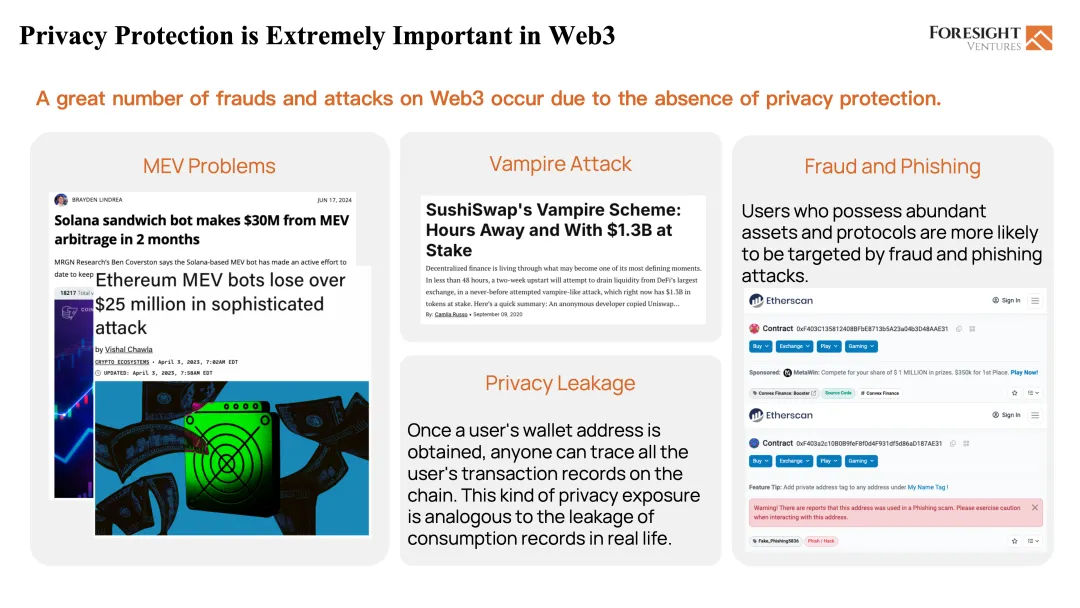
It is important to clarify that privacy protection is not equivalent to anonymity. Also, confidential transactions are different from private transactions. (In this article, confidential transactions can be understood as hidden transactions or content privacy transactions, and private transactions can be understood as fully private transactions. In this article, "privacy transactions" collectively refers to these two types of transactions.)
Confidential transactions aim to protect the privacy of transaction content.
Private transactions should not only protect the privacy of transaction content and the identities of the parties involved, but also ensure that transactions are untraceable and difficult to associate.
According to this definition, transfers on Bitcoin (BTC) and Ethereum (ETH) are neither confidential nor private transactions.
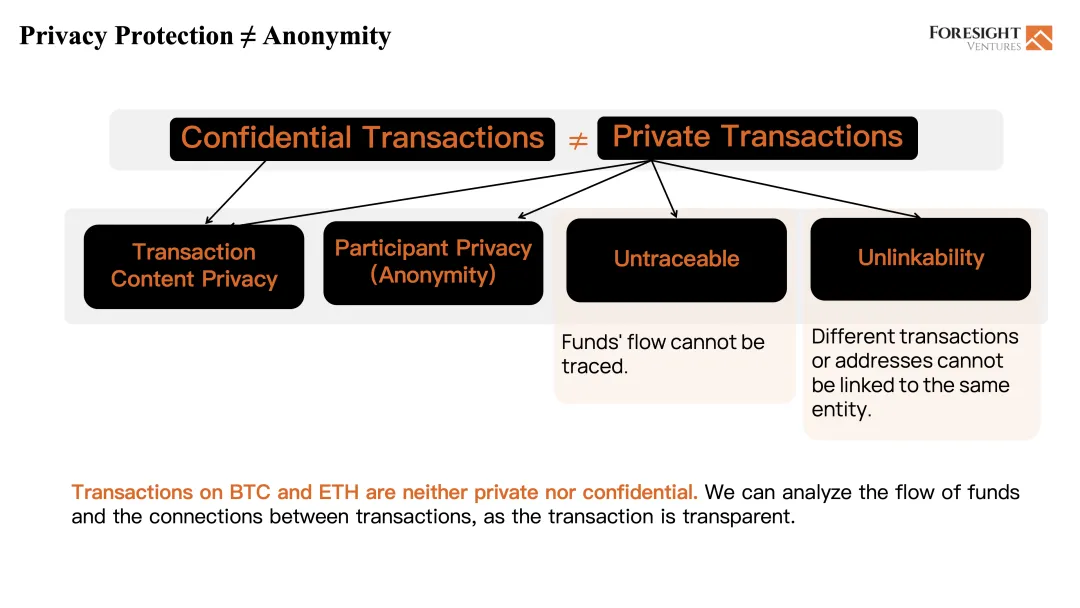
Let's take a look at the history of privacy transaction technology. This will help you understand why fully homomorphic encryption can bring about change.
In 2013, coin mixing technology emerged. Coin mixing services combine coins from multiple users and send them to multiple destination accounts, making transactions more difficult to trace and associate. However, some tools can still detect the relationship between transactions.
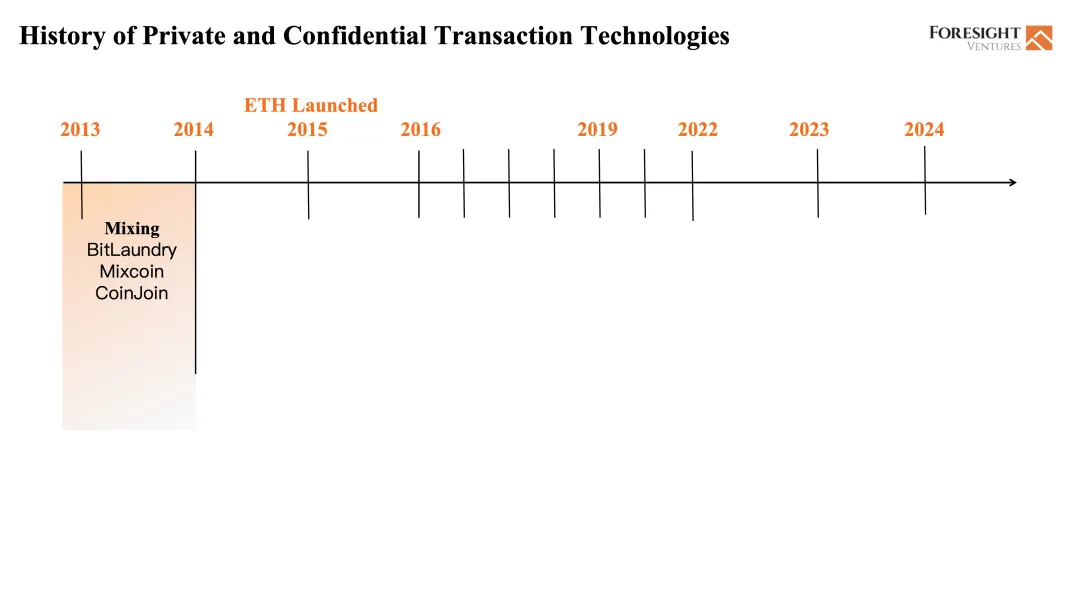
Subsequently, privacy coins such as Monero appeared, which use ring signatures and one-time keys to conceal the sender and receiver. The privacy features of Monero are widely considered to be very effective.
In 2015, Ethereum was launched, and smart contracts became popular. However, users realized that all these privacy protection methods were based on a UTXO model similar to BTC. For blockchains based on an account model like ETH, there was no way to achieve privacy protection.
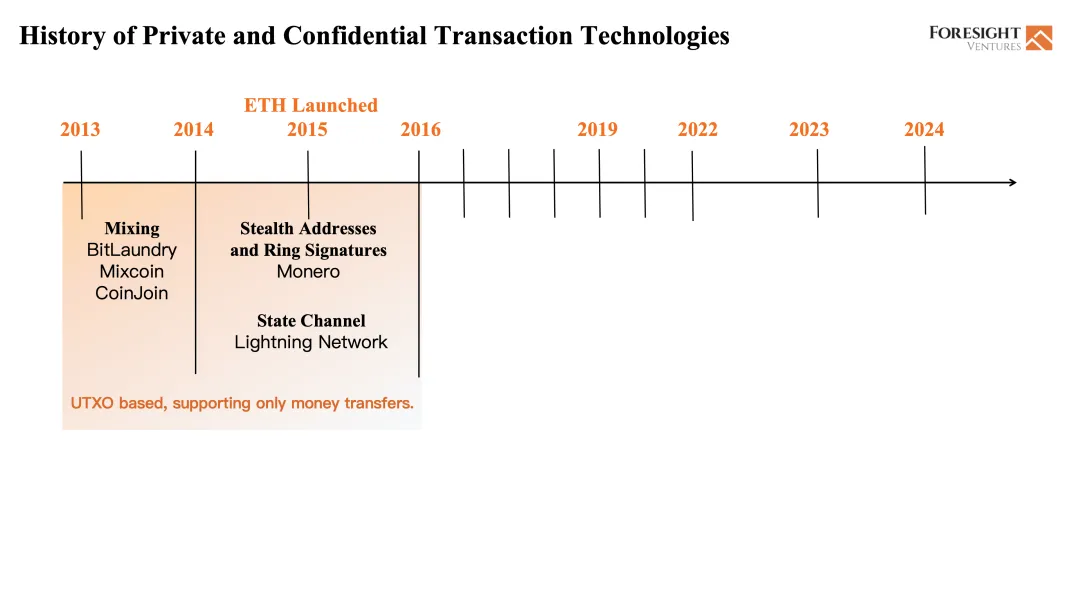
Since 2016, zero-knowledge proofs have begun to be applied in privacy protection protocols.
Tornado Cash is a zero-knowledge mixing protocol on Ethereum, which uses zero-knowledge proofs to sever the link between deposit and withdrawal addresses, providing a form of partial privacy guarantee.
Zcash provides optional privacy features, allowing users to choose between regular transparent addresses and shielded addresses used for anonymity. Zcash is built on an extended UTXO model that only supports transfers.
At that time, we still did not have private smart contracts.
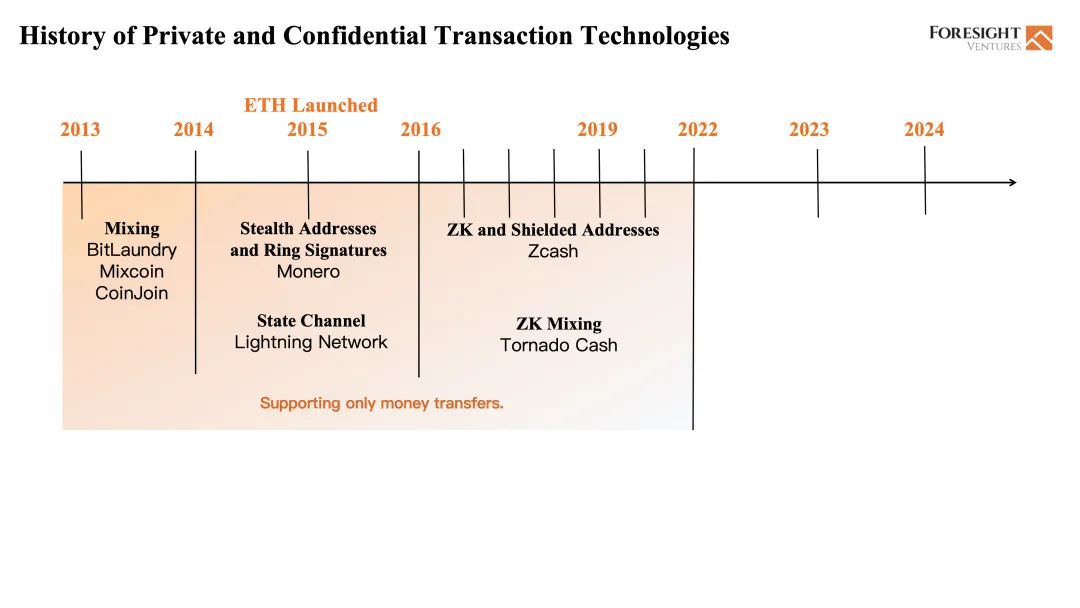
Finally, as we enter 2022, we begin to see the application of zero-knowledge proofs (ZK) and fully homomorphic encryption (FHE) in achieving privacy smart contracts.
Projects based on zero-knowledge proofs such as Aztec and Aleo have adopted privacy methods pioneered by Zcash and improved upon them, now supporting privacy smart contracts. However, they are also based on a UTXO model similar to Ethereum. And their privacy-first features are fundamentally incompatible with the Ethereum Virtual Machine (EVM) architecture and the semantics of the Solidity language due to their inability to support encrypted shared states, resulting in limitations in contract logic and applications.
Ultimately, projects like ZAMA, Fhenix, and Inco have decided to use fully homomorphic encryption to achieve on-chain privacy. ZAMA has implemented the fully homomorphic encryption Ethereum Virtual Machine (fhEVM). fhEVM is compatible with EVM and fully supports the Solidity language. It also supports encrypted shared states, allowing the global state to remain available while encrypted, and supports arbitrary computation. This flexibility enables fully homomorphic encryption to handle a wider range of business logic and meet diverse needs.
Privacy smart contracts based on fully homomorphic encryption are an incredible breakthrough, and we believe that fully homomorphic encryption will reshape on-chain privacy.

Why does fully homomorphic encryption have such great flexibility?
Fully homomorphic encryption allows us to perform any type of operation on encrypted data. When we decrypt the results of these operations, they are the same as the results of the corresponding operations on plaintext.
This is an extremely ideal privacy feature. But it is very difficult to achieve. This is why fully homomorphic encryption is called the holy grail of cryptography.
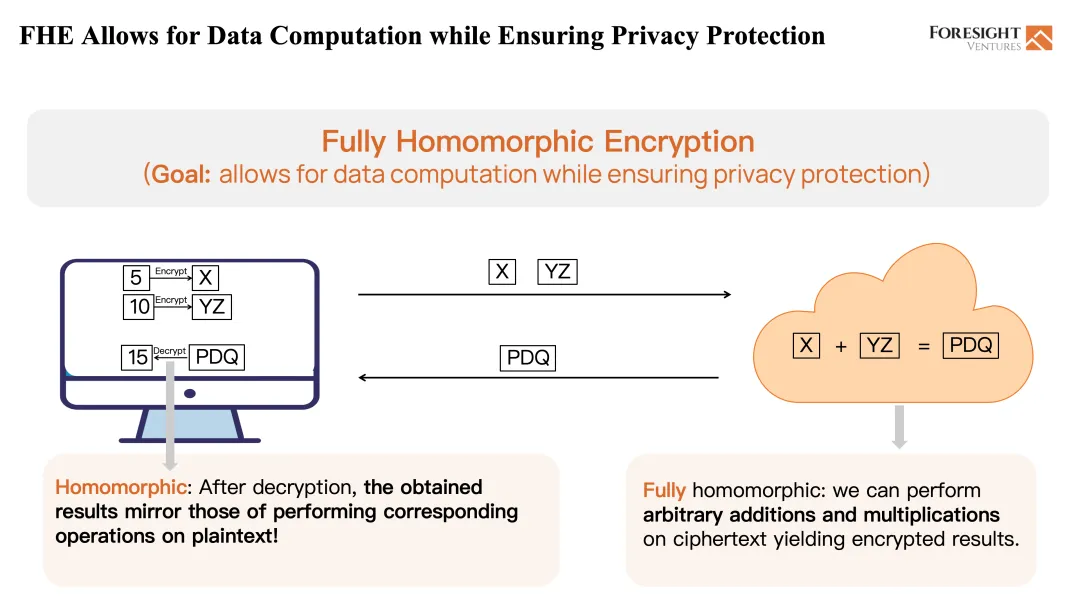
With privacy smart contracts, we can do many things that were previously impossible. Here are some use cases mentioned by Fhenix.
Fhenix is leading the on-chain application of fully homomorphic encryption. Their team consists of many top experts in the field of cryptography. CEO Guy Itzhaki has decades of experience in privacy computing and network security. In recent years, he has led Intel's fully homomorphic encryption business development team.
Fhenix launched a private development network (Devnet) in July last year. This Devnet is like a cool playground for interested developers. Developers can easily port their existing Ethereum Virtual Machine (EVM) code to Fhenix. With some adjustments, they can make their code native fully homomorphic encryption code. We are very excited to support the Fhenix team because they are using fully homomorphic encryption to build the future of on-chain privacy.
The applications they mentioned can be divided into two main categories.
One group is related to use cases of the fully homomorphic encryption Ethereum Virtual Machine (fhEVM). It unlocks more flexible privacy transactions and privacy DeFi. With privacy DeFi, users can secretly trade, borrow, and provide liquidity. It minimizes the opportunities for fraud and hacker attacks, and protects users from front-running and MEV bots. We are also excited about use cases related to governance and the autonomous world. Fully homomorphic encryption enables on-chain private voting, helping to prevent the voter bias and groupthink often seen in public voting. For the autonomous world, many on-chain games can use fully homomorphic encryption to protect business strategies and sensitive user data, such as location information.
The other group is related to artificial intelligence, such as decentralized identity (DID) and privacy-preserving decentralized artificial intelligence. Privacy protection is needed in decentralized artificial intelligence in two aspects. One is protecting the model. It is important to maintain the privacy of the model when someone uses a lot of computing power and data costs to train a model and provide services. The other is protecting the input and output. When sensitive data, such as medical data or facial images, is used for input/output during the inference process, people want to maintain their privacy. With fully homomorphic encryption, you can train and infer on encrypted data without decryption.
There are also some innovative uses in cross-chain bridges and on-chain compliance. With fully homomorphic encryption, people can store the private keys of chain A on chain B, and vice versa. This can achieve the most convenient cross-chain information transmission and significantly reduce the complexity of cross-chain processes. Through decentralized identity and account abstraction, we can implement some on-chain compliance methods.
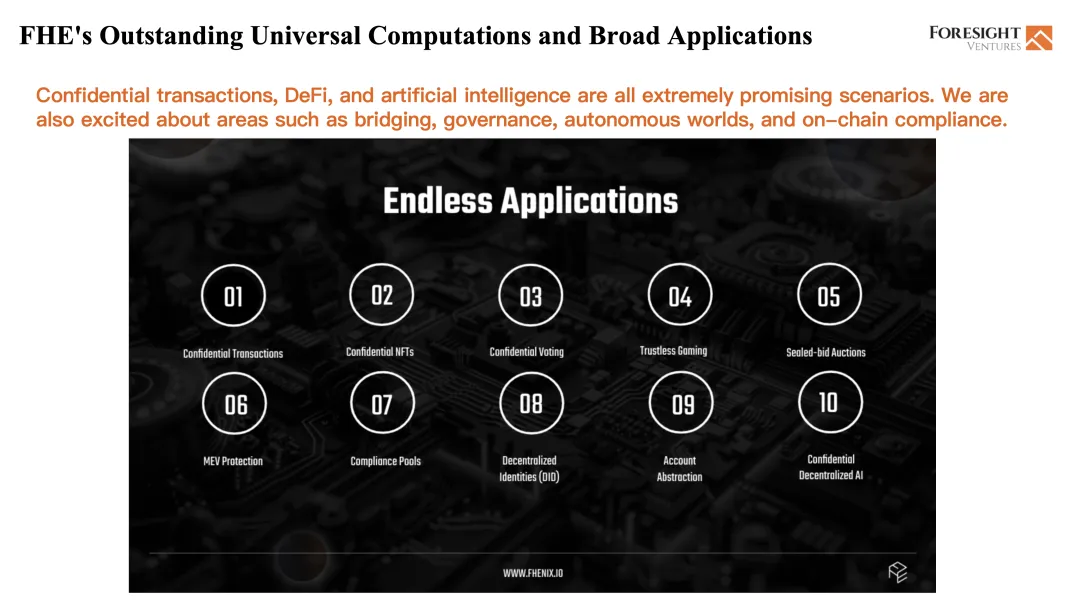
So, why should we invest in fully homomorphic encryption?
First, privacy protection is extremely important in the Web3 field.
Second, we believe that fully homomorphic encryption is the best solution to most privacy protection issues. Fully homomorphic encryption has outstanding privacy protection capabilities and supports privacy smart contracts that can perform arbitrary computations on encrypted global states. As the next generation of privacy technology, it will not only reshape on-chain privacy but also change the way all computations are done in Web2 and Web3.
Finally, fully homomorphic encryption has a wide range of potential use cases in Web3. Privacy transactions, decentralized finance, and artificial intelligence are all promising scenarios. We are also excited about innovative opportunities in cross-chain bridges, governance, the autonomous world, and on-chain compliance. We believe that fully homomorphic encryption is likely to develop better than zero-knowledge proofs. While zero-knowledge proofs are mainly used in Web3, fully homomorphic encryption will be widely applied in Web2 and Web3.
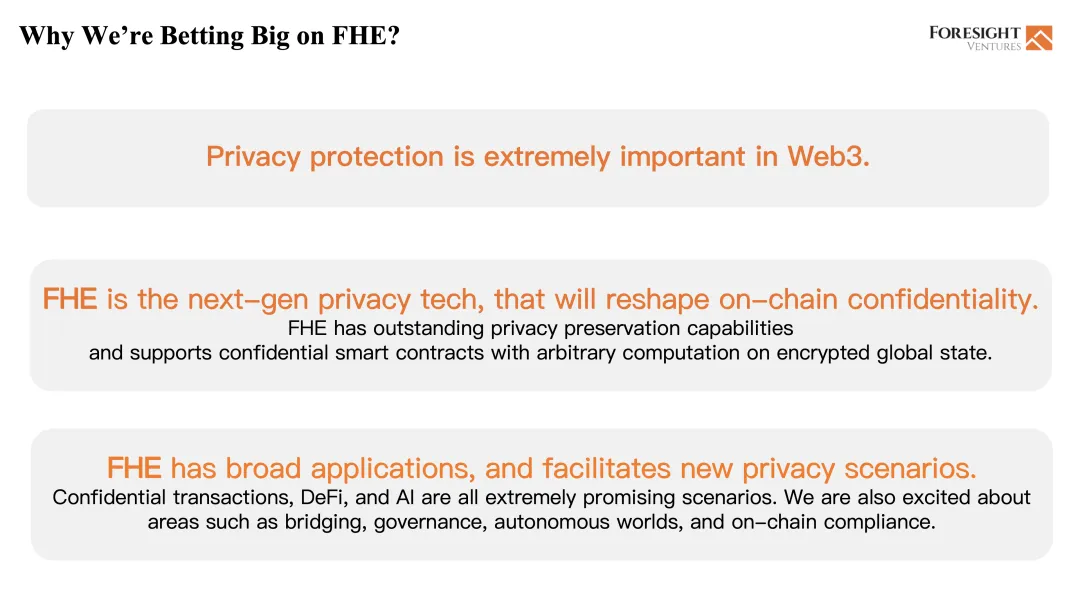
Of course, we also have some concerns about fully homomorphic encryption.
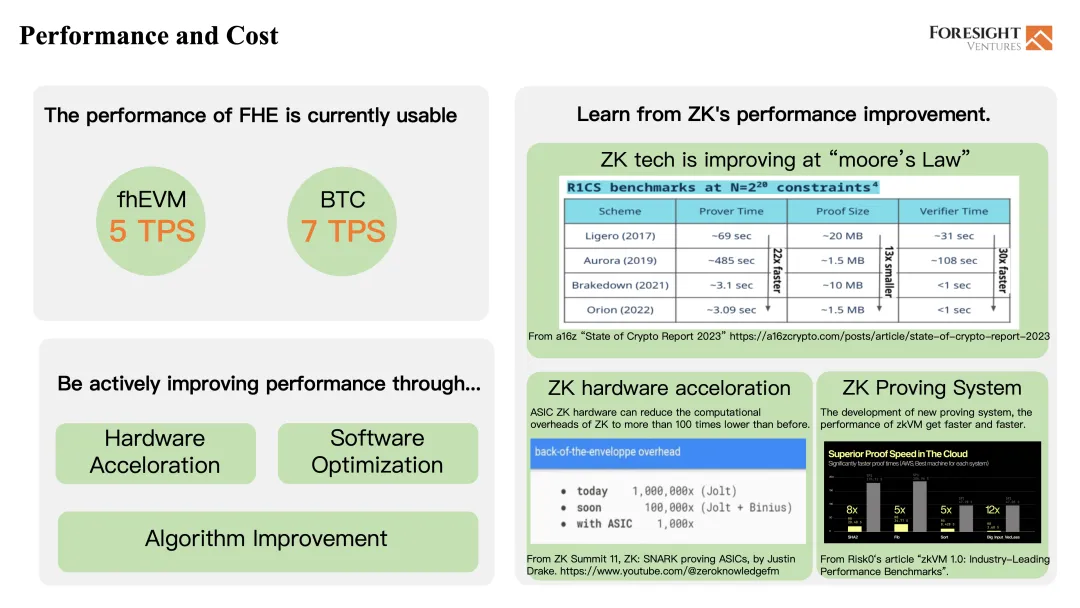
The performance and scalability of fully homomorphic encryption are still major challenges.
Currently, although fully homomorphic encryption is available, it is still very limited. The processing capacity of the fully homomorphic encryption Ethereum Virtual Machine (fhEVM) is about 5 transactions per second (TPS), similar to Bitcoin, which also has only 7 TPS.
Currently, many teams are working hard to improve the performance of fully homomorphic encryption through hardware acceleration, software optimization, and algorithm improvements.
When we see how the performance of zero-knowledge proofs has improved, we will find that in the past few years, zero-knowledge proof technology has been growing at a rate similar to Moore's Law.
New algorithms have improved performance by tens of times in terms of proof time, proof size, and verification time.
Zero-knowledge proof dedicated integrated circuit (ZK ASIC) chips can reduce the computational cost of zero-knowledge proofs by 100 times.
Zero-knowledge proof applications are also competing to improve speed. The proof system of Risk Zero is faster than Plonky3, so the corresponding zero-knowledge proof virtual machine (ZKVM) is several times faster.
So, we believe that with the support of Web3, fully homomorphic encryption's performance can experience a huge, exponential improvement, similar to what we have seen in zero-knowledge proof technology.
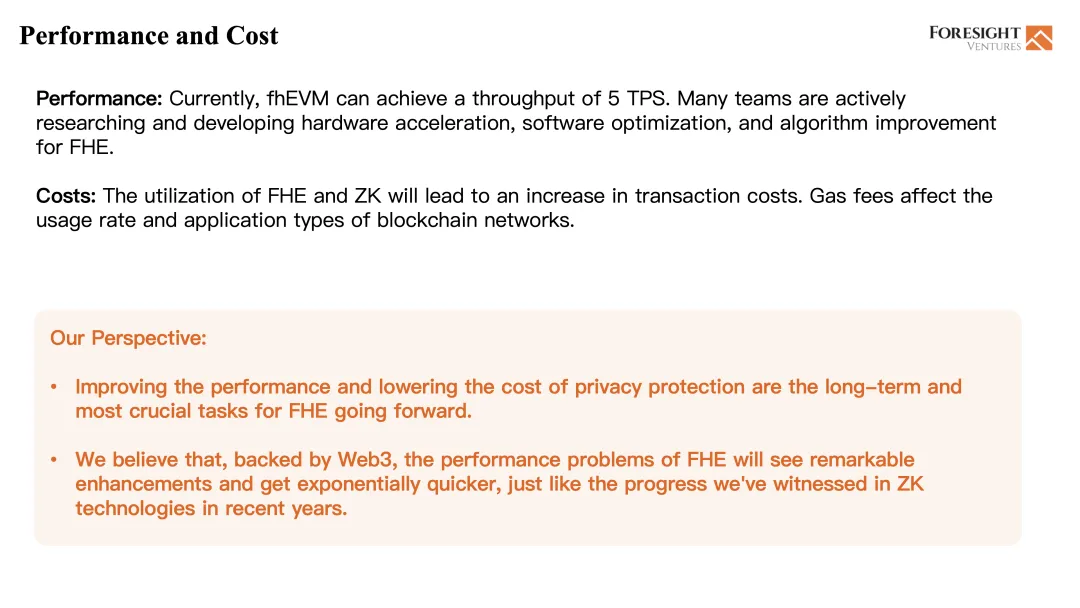
In terms of cost, both fully homomorphic encryption and zero-knowledge proofs are relatively high in computational cost and require a significant amount of resources. High Gas Fees will affect how many people use the blockchain and what kind of applications we can have.
Therefore, making fully homomorphic encryption faster and more cost-effective is a key long-term goal for the future development of this technology.
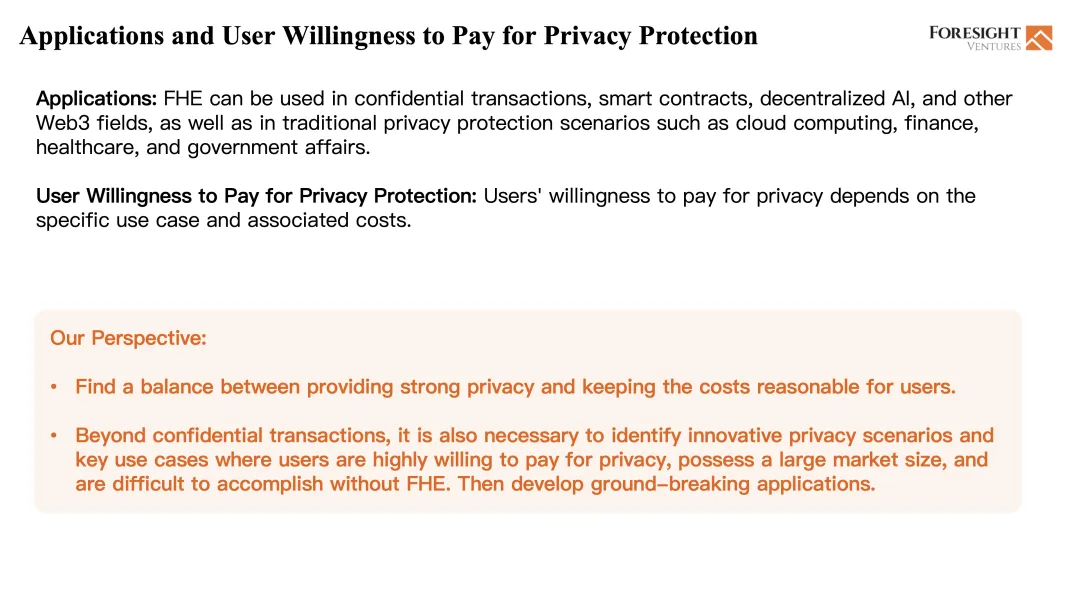
The second concern is about the willingness of users to pay for privacy protection.
We need to find a balance between providing strong privacy protection and keeping costs reasonable for users.
Additionally, we need to identify the most valuable use cases for fully homomorphic encryption and focus our efforts on those use cases. Besides privacy transactions, let's develop some groundbreaking applications.
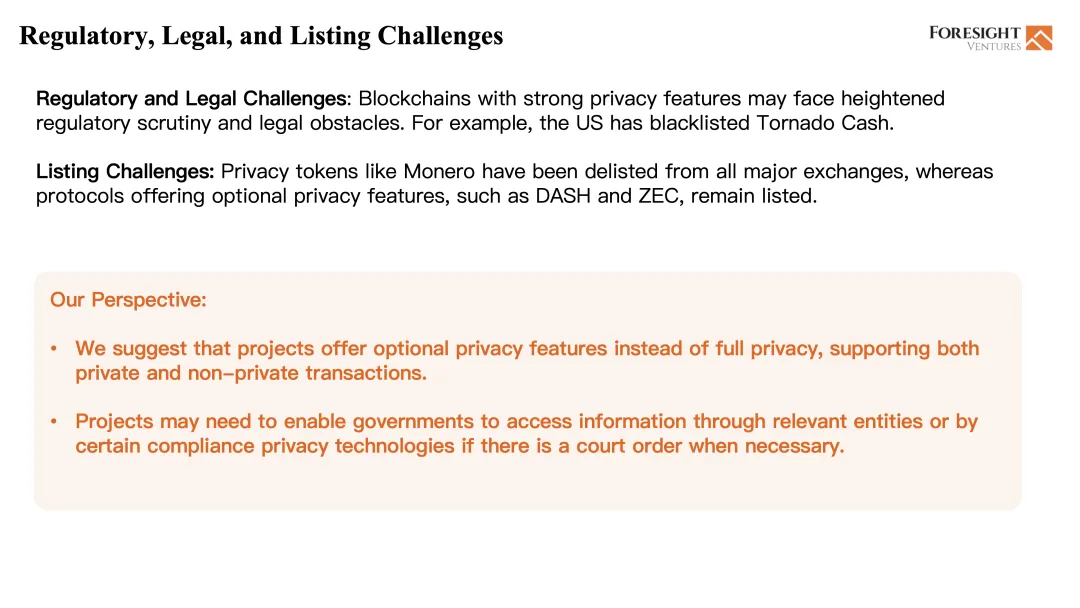
Finally, there are also challenges in compliance and listing on exchanges.
Projects with strong privacy will face stricter regulatory and legal issues. For example, the United States has blacklisted Tornado Cash.
In terms of listing on exchanges, purely private coins like Monero have been delisted from major centralized exchanges, while projects with optional privacy features like Zcash are still listed.
To address these challenges, we suggest:
Fully homomorphic encryption projects provide optional privacy rather than complete privacy.
Additionally, projects may need to consider establishing mechanisms to allow controlled access to some privacy information by the government through relevant entities or certain compliance privacy technologies, as required by law, such as under a court order.
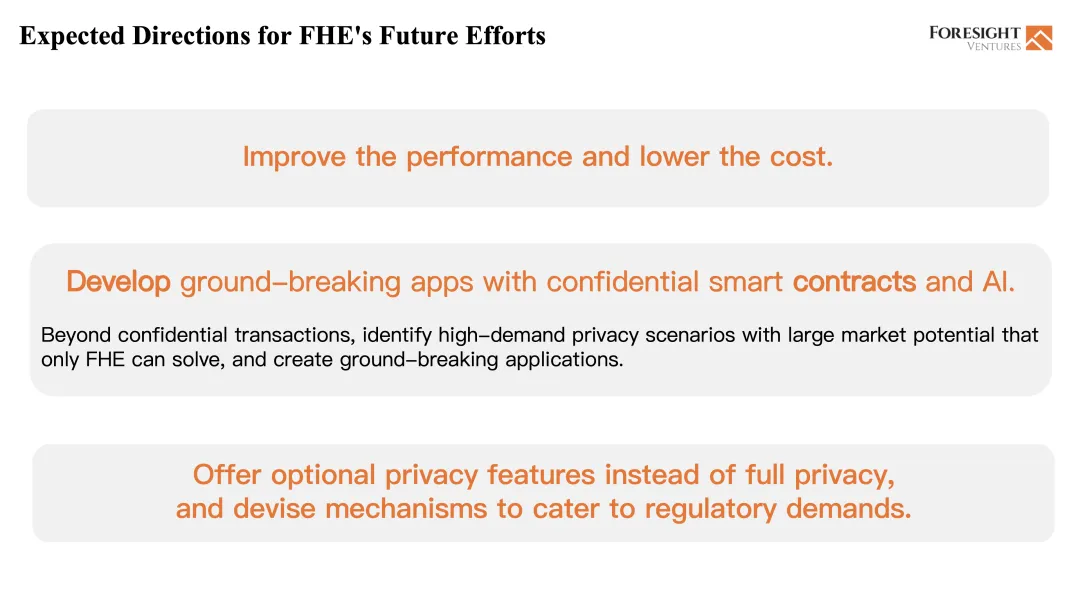
Looking ahead, we see that fully homomorphic encryption can put more effort into several key areas in the future.
First, it is crucial to improve the performance of fully homomorphic encryption and reduce its cost.
Second, it is important to identify valuable privacy use cases other than privacy transactions. Find those use cases that users are truly willing to pay for privacy, have a large market size, and are difficult to achieve without fully homomorphic encryption. Develop groundbreaking applications.
Finally, we recommend providing optional privacy rather than complete privacy. And develop compliance-friendly privacy technologies to meet regulatory requirements.
免责声明:本文章仅代表作者个人观点,不代表本平台的立场和观点。本文章仅供信息分享,不构成对任何人的任何投资建议。用户与作者之间的任何争议,与本平台无关。如网页中刊载的文章或图片涉及侵权,请提供相关的权利证明和身份证明发送邮件到support@aicoin.com,本平台相关工作人员将会进行核查。




